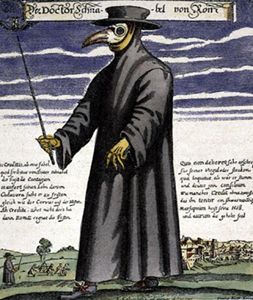[Greek] πρόσωπον (prosōpon), [Latin] facies, [Latin] persona, [Latin] apparere: mask, person, persona, face, aspect, appearance, countenance, presence, front; 78 scriptural references

Copper engraving of Doctor Schnabel (aka Dr. Beak), a plague doctor (with a beak-like mask) in the seventeenth century (circa 1656).
Background information:
Plague Doctor: A plague doctor was a medical physician who treated victims of the Bubonic plague. These physicians were hired by the towns where the plagues occurred. Some doctors wore beak-like masks filled with aromatic scents (which could be inhaled). The masks were designed to protect them from the putrid air (which was thought to be the source of the infection). The design of these clothes have been attributed to the chief physician of Louis XIII. In the years ahead, there will be other later plague doctors (epidemiologists) and frequent use of face masks.
Greek Hellenism:
Face: The face, almost always used in the plural, denotes the countenance, form, and appearance (front) of a person. The face can be used for men, gods, and armies. Hymn 10 to Aphrodite states “She give kindly gifts to men, smiles are ever on her lovely face, and lovely is the brightness that plays over it.” Xenophon’s Cyropaedia 6.3.35 states “I will gladly volunteer to hold for you the post immediately in front of the enemy’s phalanx.” Aeschylus’ Agamemnon 639 states “When a messenger’s countenance reports to people a dire distress of its army’s rout, he is packed with woes.” Plato’s Laws 854d states “Whosoever is caught robbing a temple, his curse shall be branded on his forehand and of his limbs.”
Mask: The mask is the role or part assigned to oneself in life (or on the stage). The mask worn by actors often resembles a human face. Epictetus’ Enchiridion 17 states “Remember that you are an actor in a drama of such sort the author chooses. For this is your business to act well the given part.” Polybius’ Histories 6.53 states “Whenever one of their illustrious men die, they place the likeness of the deceased in the most conspicuous place. This likeness consists of a mask made to represent with extraordinary fidelity both with shape and color.”
Person: The person takes on the sense of the man (or woman) in his (or her) position in society. For writers, a character takes on a true persona through direct sight and experience. Polybius’ Histories 12.27 states “Homer introduces Odysseus as one who wondered far and wide, and towns of many saw, and learnt their mind and suffered much in heart by land and sea.” Polybius’ Histories 5.107 states “Elated with their victory at Rhaphia, they refused any longer to receive orders from the king, but looked for a leader to represent them.” Polybius’ Histories 8.13 states “Phillip transfers his attention to the great name and splendid personality of a nation like Greece.”
Old Testament: This term, quite frequently found, refers to the face, the front (of an object), the side (of the face) turned to the fore, and encountering. The face can mean feature, appearance, matter, and essence of the whole person. The face becomes involved in respectful greetings, veneration, and audiences. The ‘front (side)’ refers to persons and inanimate objects. Semitic languages employ numerous prepositions to convey relationships, distance, location, and geography. Anthropomorphism conveys human qualities and characteristics to God. Seeing the ‘face of God’ takes on a metaphorical sense. God reveals Himself through the Word, not through physically seeing His face. In a cultic sense, to see God’s face means visiting the cultic site. The notion perhaps is originally derived from the non-Israelite cults housing idols in the temple. Therefore, to see the face of God means to be certain of His presence and grace.
New Testament: This term means face, person, surface, front (side), appearance, and presence. Not surprisingly, there are no direct mention of masks. However, there are indirect references to cloudy, veiled, or unclear sight (vision). Face is used in Hebrew idioms and expressions in conveying various actions. Appearances or features indicate the kind (sense) of a person. Referencing the front side (of a person), prepositions are frequently used to indicate intentions, actions, spatial orientation, direction, and geography. In the earthly realm, God’s countenance can only be perceived. However, God’s countenance will be visually seen in the heavenly realm. Person, used in the plural form, can also reference many people.
Selected examples of scripture: (Let’s face it, there is a lot of face time (many examples) going on in the scriptures. Since my primary focus is on masks, I will only select few examples of how such scriptural examples are used.)
Mt. 6:17: Hypocrites neglect their appearances. (One’s physical body) [In a sense, the hypocrites put on a mask of seeking attention.]
Mt. 11:10: I am sending a messenger ahead of you. (Prepositional placing John the Baptist before Jesus).
Mt. 18:10: Look upon the face of My heavenly Father. (Anthropomorphism: assigning human qualities to God)
Mt.26:39: He fell prostrate in prayer. (Bowing His face in prayer)
Lk.9:51: He determined to journey to Jerusalem. (Turning His face forward to his destination)
Lk.21:35: Everyone who lives on the face of the earth. (The earth having human characteristics)

Hypocrites: The Greek hupocrites is made up of the preposition hupo- (under) and the verb krino (to judge). The hypocrite, one who pretends or acts under a persona (mask), pretends to be someone or something they are not. In the ancient Greek theater, actors wore large masks to mark which character they were playing. The Pharisees were hypocrites who neglected their appearances, seeking to be seen as fasting (Mt.6:16).
Conclusion:
Persona, person, appearance
You have to admit that the image of the plague doctor (Dr. Schnabel) is sort of creepy. Schnabel is the German word for beak. Yet, there seems to be a practical basis for this beak-like mask. It was thought that the putrid air was the cause of the infection.
Unlike the Old Testament and New Testament, mortals could see the faces of their gods. It is significant to note that ‘face’ was used in the plural form. Therefore, the ‘face’ of the enemy can be viewed as the whole enemy.
I think Epictetus provides us with wisdom in saying that each of us is an actor that plays his (or her) part in the drama of which the author chooses. It is interesting to note that many of the Greek plays were actually commentaries on the human condition. A likeness (mask) was often crated to memorialize the status of an illustrious person. Madame Tussauds’ Wax Museum suddenly comes to mind.
A character can take on a true persona from direct sight and experience. Homer provides an important window into the world of Greek epics.
In the Old Testament, many Hebrew idioms and expressions employ the term ‘face’ to convey intentions and actions. In some situations, God can take on human characteristics. The ‘face of God’ generally takes on a metaphorical sense of His presence. Man is not capable of actually physically seeing the ‘face of God.’
The New Testament continues the Old Testament understanding of this term. To be honest, I was not really surprised that there was no mention of masks in scripture. However, the hypocrite wears a mask of a sort when he acts or pretends. One also can say that we too are also like actors who play a part in the drama of our lives. In this case, God is the author who writes this script for each of us.
Coronavirus update: First of all, the mask will be forever identified with this pandemic for some time to come. Our fears, worries, and insecurities have also come to the fore ‘front’. This crisis has brought to light heroes, victims, hoarders, idiots (Co-vidiots), and rest of us (the more or less responsible persons [faces]). The heroes (doctors, nurses, and medical staff) continue on the ‘front-lines’ in this pandemic. The victims include not only the patients, but also all of us who have been displaced by the economic shutdown. The hoarders appeared because of their selfishness, greed, and panic. Well, we know who were the Co-vidiots during this crisis (no explanation needed)! Then there are the rest of us who are trying to do the best we can. A times we forget to social distance. Politicization of this crisis has unfortunately continued with conservative/liberal and red state/blue state arguments (and talking points). (If it is any consolation, I will be making my final comments about this pandemic in my next post).
In various ways, this pandemic crisis continues to ‘unmask’ our true character (good, bad, ugly, creepy, and somewhere in between).
